Compare the ways in which Plath and Hughes write about relationships. You must include in your response detailed critical discussion of Morning Song and at least one other poem by Plath.
Compare the ways in which Plath and Hughes write about relationships. You must include in your response detailed critical discussion of ‘Morning Song’ and at least one other poem by Plath.
Morning Song was written at the time of the birth of Plath’s first child Frieda, in April 1960. The poem’s title marks a new beginning and the start of the relationship between Plath and her newborn daughter, ‘Morning Song’. It’s a positive start to the poem and almost sounds like a nursery rhyme. The poem generally has a positive theme throughout it. Plath opens her poem by talking about the baby as a ‘fat gold watch’; Plath’s use of language of the word ‘gold’ may have been used to show how precious the child is, and how it’s the most important thing to her as it was made out of love suggesting her relationship with Hughes at the time was a loving one. And the ‘watch’ is perhaps Plath suggesting time spent together as a family, or it may be Plath putting forward a pessimistic thought that eventually, that watch will stop working just as our body does one day. From the next stanza we see that the mother is glad, as she talks about the great celebration that the baby has brought as ‘voices echo’ possibly Plath telling everyone about the new arrival and the positive relation she hopes to develop. We get the image that Plath worships her baby, as ‘...new statue’ suggests she doesn’t think of her daughter as any less than a work of art. Plath mentions the ‘drafty museum’ maybe to explain how she will protect the baby as many people are going to want and come view the baby as Plath already suggested the baby being a work of art, and as art has it admirers, the baby has the visitors. Plath suggests that the baby is dependent on his/her parents, as she mentions the baby ‘Shadows’ their ‘safety’, and as the parents have another life to look after and the parents can’t just think about themselves anymore. Plath’s use of language creates a mental image in the last line, as she refers to herself and other visitors as ‘walls’ providing shelter and protection for the baby, almost encasing the baby inside. The third stanza starts with Plath’s possible fears of becoming a mother as she writes as if she’s talking to the baby saying that, ‘I am no more your mother’ and then referring to herself as ‘the cloud’ suggesting there is nothing there, as a cloud is not water it’s just a faint mist, reinforcing the idea that Plath is maybe not ready for the great responsibility of a baby as she doesn’t feel like a mother. She’s perhaps scared and doesn’t know how she’s going to cope. And so she suggests that she may not be able to foster their relationship as she’s feeling she may let her child down and so wants things to go ‘slow’ so she could possibly find a comfort zone. In the following stanza Plath carefully uses very soft-sounding and delicate wording such as, ‘moth-breath’ suggesting you can’t hear the baby breathing, and so creates a very tranquil image as the baby’s breathing sounds almost like the tiny fluttering of wings. Plath describes how she knows when the baby is about to cry from her motherly instinct, ‘...A far sea moves in my ear’ suggesting she wants to comfort the baby before it even wakes up, possibly Plath being over-protective as she doesn’t want her baby to feel any discomfort and so is actually waiting for the baby to be awake. Plath connects the last stanza back to the title by describing the baby’s crying in the ‘morning’ as the ‘notes’ that make up a ‘song’, as even in the previous stanza Plath mentions it’s getting brighter outside by the light coming through ‘...The window square’ suggesting its morning, and possibly a new beginning for Plath and her baby.








